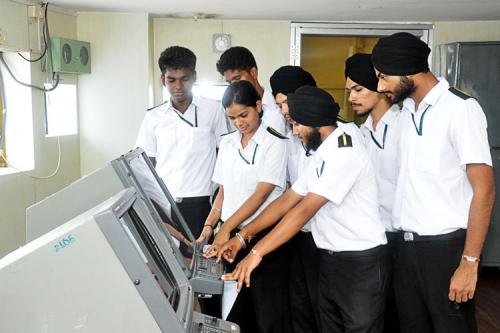What is the Difference between Nautical Science and Marine Engineering?

If you happen to be the person who wants to choose a career at the sea but doesn’t possess the adequate amount of resources about marine careers for guiding you, it could get extremely frustrating. Considering the increasing number of queries from aspiring candidates about the difference between Nautical Science and Marine Engineering, this article aims to attempt to clear these doubts or queries. If you have been considering joining one of these courses, this post can give you some clarity, so read on!
There are primarily two marine engineering courses if you want to work as an officer on the merchant ship. You might have to choose to get a diploma or degree in nautical science or marine engineering.
Nautical Science
Opting to go ahead with nautical science will prepare a candidate to become a deck officer. This is a three-year course that will earn you a degree or diploma. Post this, the candidate can join a ship to work as a trainee cadet officer (popularly referred to by the term deck cadet).
After the completion of sufficient time onboard a ship (the experience or sea time expected as a deck cadet changes based on the course pursued at the UG level and clearing the necessary certificate of competency examinations), a cadet gets qualified for being employed as a navigating officer on a merchant ship.
During your nautical science course, you can gain theoretical as well as practical knowledge that is important for seamanship, collision prevention, chart work, navigation, bridge equipment, watchkeeping, cargo handling, and storage, ship stability, elementary naval architecture, marine signaling, meteorology, ship maintenance, and operation. Besides these, you would get a good knowledge of managerial skills. Practical training is very important for a deck officer. This in-detail procedure, as well as maintenance techniques for important deck machinery, forms a vital part of marine engineering courses.
Many modular courses that are necessary for joining a ship are also encompassed in the course structure of nautical science, something that is compulsory according to the IMO STCW Convention. At the most basic level, such courses also include Personal Survival Techniques, Elementary First Aid, Fire Fighting, Fire Prevention, Personal Safety and Social Responsibility. A complete, advanced version of all of these courses has to be completed prior to appearing for the examinations about certificate of competency. These are nothing but short courses, which range anywhere between 2-5 days.
Marine Engineering
Marine engineering is a field that works with the aspect of engineering in the maritime industry. Similar to any traditional engineering course, this is also a four-year course to prepare a candidate for becoming an engineer on a ship.
Marine engineering mainly concerns everything on the topic of machinery on a ship, boat, yacht, or any other sea vessel. There are many other technical streams sprouting out of this topic. The curriculum of this course concentrates on developing technical knowledge of theoretical as well as practical marine engineering. Increased importance is on imparting skills and competencies required for the operation and maintenance of machinery onboard a ship.
The topics discussed in the first and the second year, of course, are virtually the same as those taught in traditional mechanical engineering. The key focus is on the introduction of engineering sciences to students while making them realize the applications of such sciences in the numerous aspects of marine engineering.
The third and the final year is completely dedicated to mastering the technicalities in the marine field. Theoretical and practical elements of marine machinery are covered with a particular emphasis on the operation of a ship and the upkeep of marine machinery. Hands-on training through laboratory as well as workshops is given throughout the course of four years so that all students obtain practical knowledge about dismantling or maintenance of machines onboard a ship.
Post completion of the course at the best marine engineering colleges, the said engineer cadet needs to spend a stipulated amount of time at sea for gaining the experience that is needed to appear for the certificate of competency examinations of engineering. Passing these exams gives you the ticket to becoming a certified onboard engineer officer.
Conclusion
Both of these streams have their own niche subjects and expect real interest from the candidate for successful completion of the shore-based element and for becoming a qualified officer. Every aspirant must carry out thorough research of the stream they want to pursue to ensure that their interest in the course and the career never wanes.
Both of these have their positive and negative sides that are dependent on the candidate. They need to decide what they want and what they are interested in. On the basis of all of these factors, they need to make a well-informed decision about the direction in which they want to step.
Advertise on APSense
This advertising space is available.
Post Your Ad Here
Post Your Ad Here
Comments